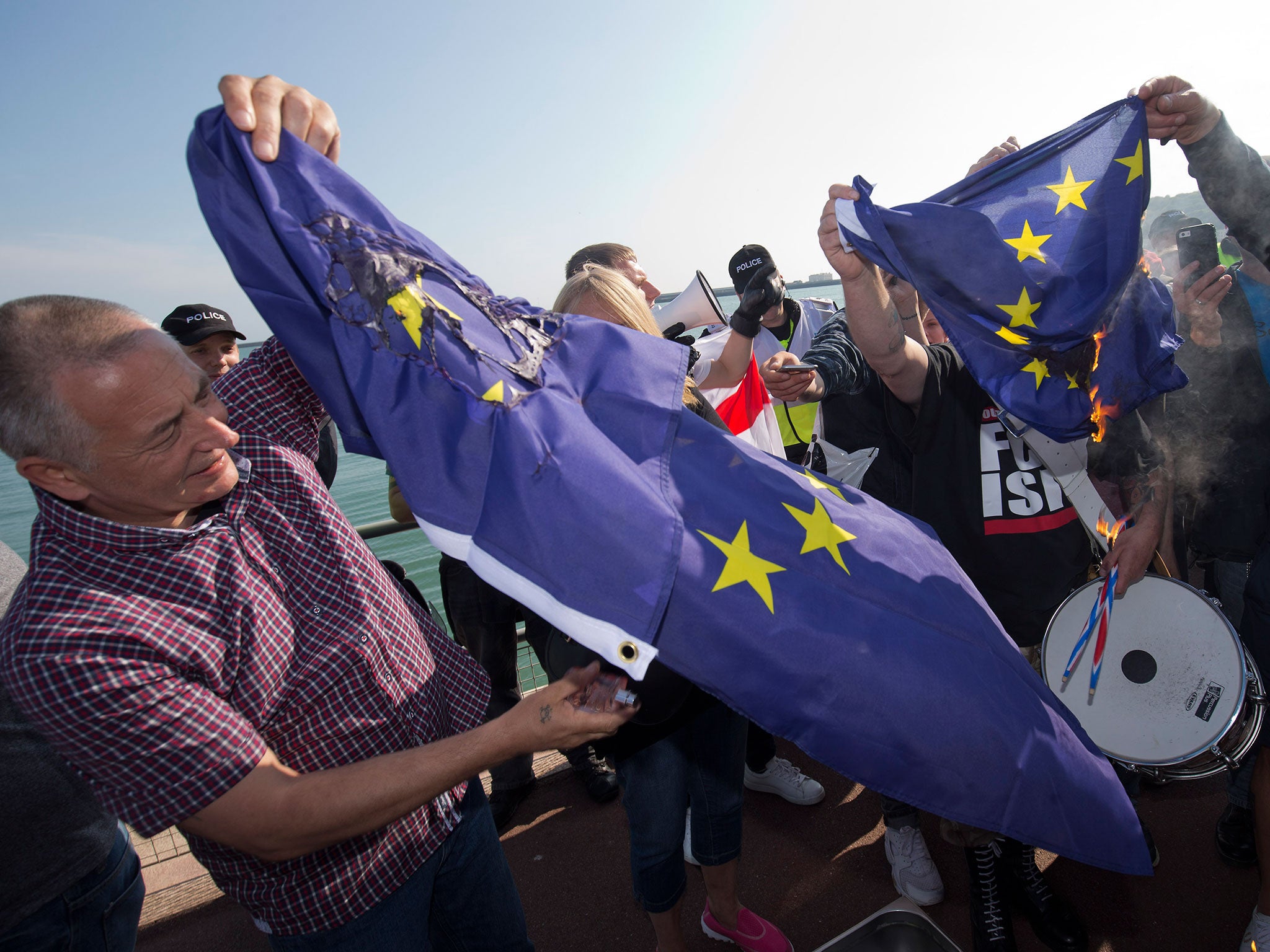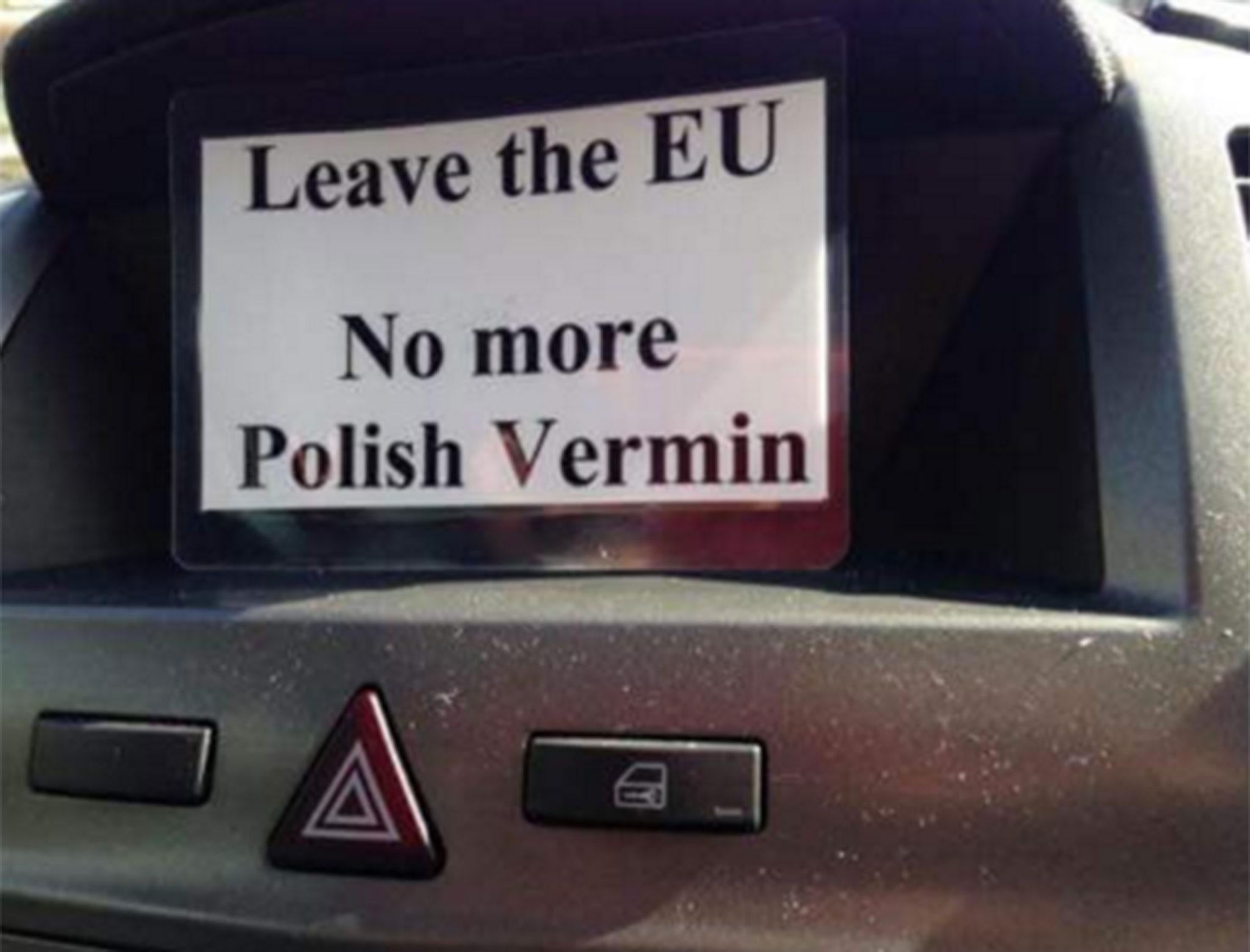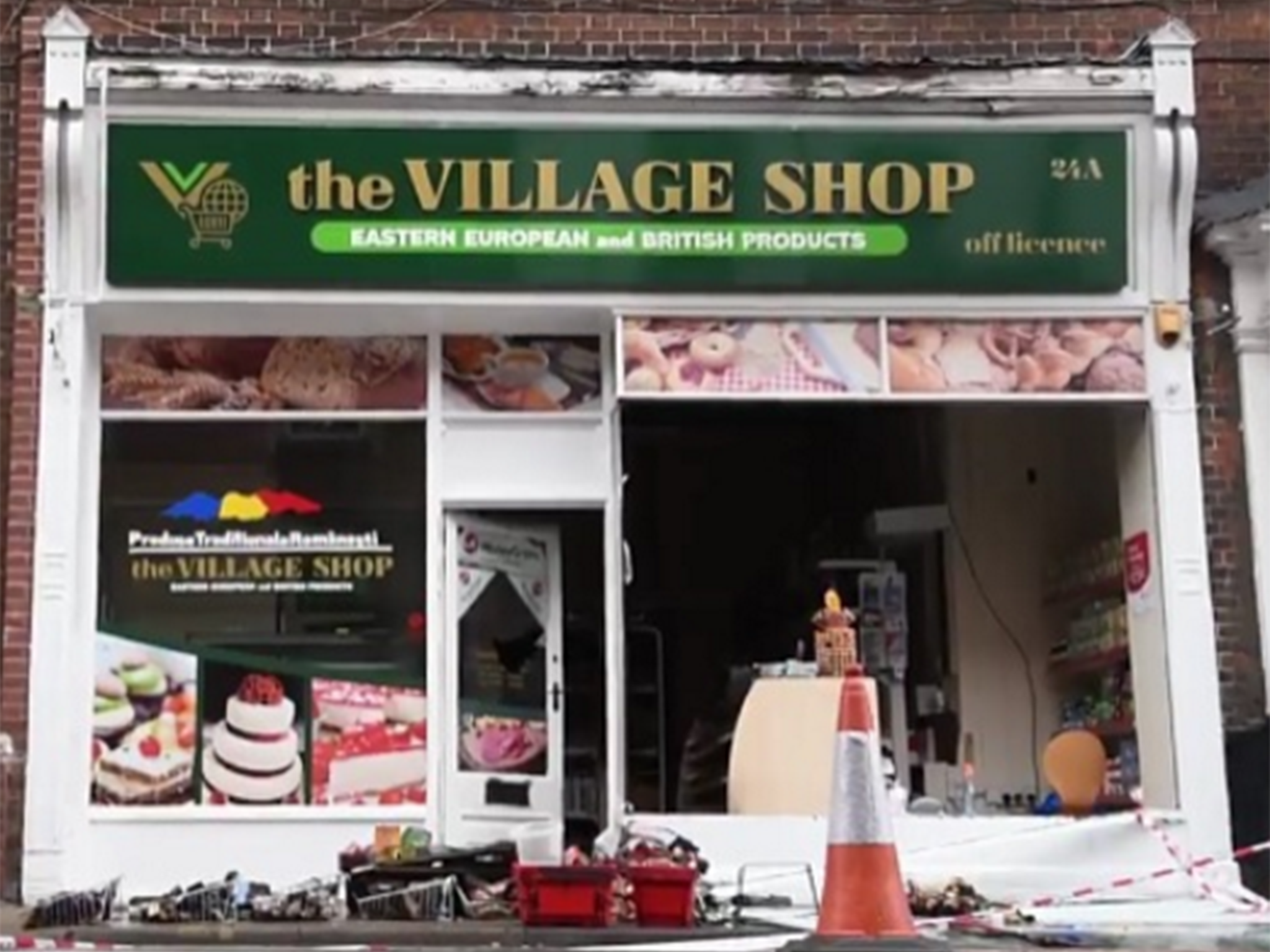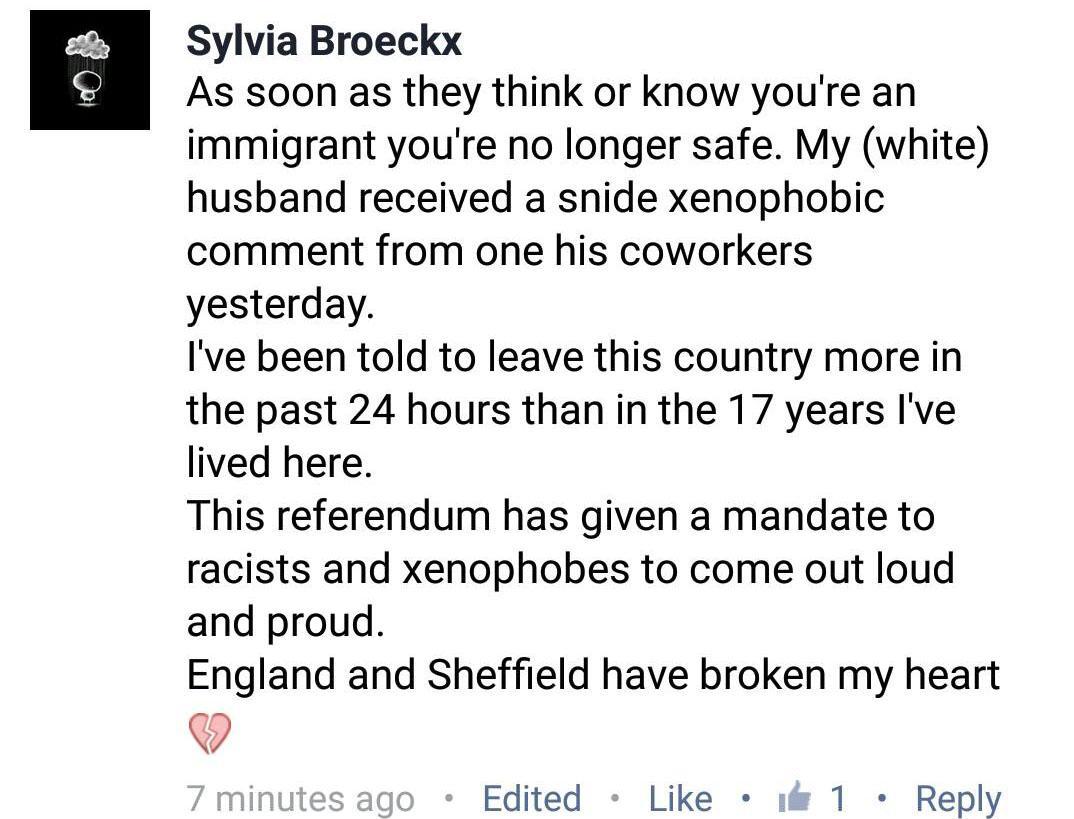Racism unleashed: Incident by incident – the grim litany of post-Brexit hate crime
Exclusive: At least 500 incidents in the last five weeks have included racist letters in Tunbridge Wells, swastikas from Plymouth to Glasgow, chants in London of ‘First we’ll get the Poles out, then the gays!’ and violence in Yeovil

Your support helps us to tell the story
From reproductive rights to climate change to Big Tech, The Independent is on the ground when the story is developing. Whether it's investigating the financials of Elon Musk's pro-Trump PAC or producing our latest documentary, 'The A Word', which shines a light on the American women fighting for reproductive rights, we know how important it is to parse out the facts from the messaging.
At such a critical moment in US history, we need reporters on the ground. Your donation allows us to keep sending journalists to speak to both sides of the story.
The Independent is trusted by Americans across the entire political spectrum. And unlike many other quality news outlets, we choose not to lock Americans out of our reporting and analysis with paywalls. We believe quality journalism should be available to everyone, paid for by those who can afford it.
Your support makes all the difference.On the morning of Tuesday June 28, five days after Britain voted for Brexit in the EU referendum, a single telephone call turned a routine radio talk show into something far more disturbing.
Karen, the caller, was sobbing, barely able to contain her fear, or bewilderment.
"I'm so scared,” she said. “I’m German. I’ve been here since 1973. My [late] husband was British, a GP. I have lived here 43 years … I never had any problems before … I am so scared now.
“I have had friends of mine saying they can’t be friends any more … I am so frightened. I have had dog turd thrown at my door, told to go back home … My neighbours told me they don't want me living in this road and they are not friends with foreigners.
“My friend's grandson, seven years old, got beaten up because he had a foreign grandmother.
“I haven’t been out of the house for three days. I am so, so scared.”
Seemingly shocked, the LBC host James O’Brien did his best. He told Karen that however they had voted, the huge majority of British people were on her side. She was not alone, he insisted.
And indeed social media soon rallied with expressions of outrage at the racists and support for Karen.
But the grim truth remained inescapable. Karen really wasn’t alone. Because there were hundreds of other victims. After the Brexit result, after a referendum debate where ‘taking back control’ of immigration took centre stage, racism had bared its teeth.
Cards saying “no more Polish vermin” were left on cars near a school in Huntingdon, Cambridgeshire. Racist graffiti was daubed over the entrance of the Polish Social and Cultural Association in Hammersmith, west London.
By June 27 the National Police Chiefs’ Council was saying racist incidents nationally were up 57 per cent in the aftermath of the EU referendum.

And now The Independent has analysed some 500 accounts of incidents collected by the twitter page PostRefRacism, the website iStreetWatch, the Facebook group Worrying Signs and the Institute of Race Relations, to map the race hate that has occurred since June 24, the day the referendum result was announced.
It is everywhere: swastikas in Armagh, Sheffield, Plymouth, Leicester, London and Glasgow; dog excrement through the letter box in Rugby; “F*** off to Poland” letters in Tunbridge Wells.
It is in hospitals: in Oxford, a city where more than 70 per cent voted remain, a Polish clinician was told to “f****** go back to where you belong". A nationwide poll for Network Locum, an online platform for GP locums, this week found that almost half (47 per cent) had noticed more racism after the Brexit vote.
It is in schools: the daughter of a Polish family told to “f*** off back to your country” by a classmate in Essex; a British Asian girl in Broadstairs, Kent, being asked “When are you going home?” by her fellow primary school pupils.
Out of the 500 incidents examined by The Independent, 47 - nearly ten per cent - featured children as either victims or witnesses to racism directed at their parents.
In 26 of the racist incidents, children were the perpetrators. The youngest where the age could be verified was 10 years old.
Nor could glib generalisations about this being the work of the disenchanted and disenfranchised account for everything.
On June 27 PostRefRacism was told about the online booking made for a “top London restaurant.”
“9.30pm,” it read. “I want British waiter please. Don’t send any Europeans to my table.”
And describing her tormentors, Karen herself had noted, incredulously: “I live in a middle class area. The people doing it are middle class pensioners.”
Much of this racism has been triumphalist in tone, vicious in intent, and even more irrational than you might imagine.
China has no hope of joining the EU and its free movement zone. That didn’t prevent an 81-year-old Chinese pensioner, a UK resident since 1964, being told to leave and asked why she was still here after the Brexit vote, by a group of teenage schoolchildren in Colchester, Essex.
Islamophobia occurred all over the country, even in the West Yorkshire constituency next to that of Jo Cox, the MP who was killed and who had done so much to combat such hatred. In neighbouring Dewsbury, a seven-year-old Muslim girl and her family were told: “It’s the best day ever today: go home all of you.”
The Archbishop of Canterbury has railed against “an outwelling of poison and hatred that I cannot remember for many years.” And he should know. He delivered his House of Lords speech on July 5, eight days after a guard at his own cathedral told a brown skinned UK-resident: “Dover’s that way, love.”
It seems we now live in a country where gangs of men can stop passers-by and demand proof that they can speak English; where a Polish man in Yeovil facing such a test can be beaten and left with a potentially life-changing eye injury.
In a Leicester shop, a young Polish girl can be told she must now pay for her previously free bag because “We voted leave and now you have to pay us".
And in London a group can walk down a Covent Garden street chanting: “First we’ll get the Poles out, then the gays!”
“First they came for the Jews,” seems to have sprung to some minds.
Reporting an attack on a Romanian lesbian in Oxford, the actress Juliet Stevenson saw: “Strains of 1930s Nazi Germany”.

And yet, in a thoroughly counterintuitive way, it may be possible to see something positive in the 500 reported incidents. Because they were reported.
“I actually get worried when reported hate crime figures go down,” says Assistant Chief Constable Mark Hamilton, the lead on hate crime for the National Police Chiefs’ Council. “That’s when I worry about whether we are in touch with communities, or whether people are suffering in silence.”
By contrast, he says, the very act of reporting a hate crime sends the message: “This society reports this because it considers it unacceptable.’”
He invites you to draw your own conclusions from a colleague’s finding that “there is more hate crime reported to the police in London than in the whole of the US” - despite the US having 35 times London’s population and all the tensions suggested by the Dallas shootings.
Here, people have reported race hate – and their anger at it – in droves.
PostRefRacism - encouraging people to use social media to record and draw attention to racist incidents - was started, not by any official organisation, but by 24-year-old Karissa Singh. The day after the referendum, while drinking with her brother in South Kensington, she was told: “I know we’ve voted to leave Europe but we should have voted to kick all you lot out.”
Ms Singh and her brother told the man they were born in Newport Gwent Hospital, Wales, and were as British as he. Then she started PostRefRacism.
It has now acquired 9,790 followers - if we live in a society where these things can happen in the first place, perhaps we also have many, many people who refuse to let evil flourish.
There are the ‘All People are Welcome Here’ signs in Deptford, south-east London, the hundreds who rallied in Norwich in support of Romanians whose shop was attacked by arsonists. In Glasgow they have responded to the swastikas by writing “Nae room fae racism” on the pavement.
The figures also suggest a temporary spike, akin to the tripling of Anti-Islam hate crimes recorded after the Paris attacks last November.
The referendum debate and result emboldened a lot of people. They felt justified. They thought they could say racist things in public. They lost their shame
Mr Hamilton says that there were 225 hate incidents reported to the police in the UK on June 24 and 289 incidents the day after. But by June 30 they were down to 110, closer to the pre-referendum ‘norm’ of about 190 per day.
All of which leads Mr Hamilton and others to suggest that we are not witnessing any sort of 1930s Germany scenario. Rather, it is a glimpse of what may have been hiding in plain sight for years - “floating hate”, Mr Hamilton calls it.
Although that itself might seem disturbing enough.
Before, suggests Liz Fekete, director of the Institute for Race Relations, the hate was simmering but, “They had this idea that it was not correct to be overtly racist.”
“Then the referendum debate and result emboldened a lot of people. They felt justified. They thought they could say racist things in public. They lost their shame.”
And so on the morning of 24 June, a London landlord told his Romanian tenants, with undisguised hostility, that he wanted them out of the house as soon as possible. The Romanians protested that the tenancy agreement wasn’t up, that they had got on well for years. The landlord said he didn’t want to rent to immigrants any more.
In St Austell, Cornwall, someone could tell an immigrant they were “proud to be racist”, even as that immigrant worked to help a member of their family.
And the impression that this “floating hate” had been there all along, waiting for a chance to boil over, was reinforced by the testimony of a Romanian in Hull.
He was subjected to three anti-immigrant diatribes in one post-referendum bus ride - but the only unusual thing about it was the frequency of the racist jibes:
“I'm a Romanian living and working in the North of England. I am normally on the receiving end of racist comments on a weekly basis.”

“The referendum may have given them licence,” concludes Mr Hamilton, “But these people weren’t born on referendum day.”
You can, indeed, find signs of a long back story to post-referendum racism. Like, for instance, the sign placed at a bus stop near Thetford, Norfolk.
“P*** off home EU scum,” it said. “We don't want your grubby berry picking paws dragging round here, ruining our beautiful English land with your swan eating.”
Swan eating. It’s also mentioned on the website of Liberty GB, the party fielding an ex-BNP member as a candidate in the Batley and Spen by-election caused by the death of Jo Cox.
Look beneath the 27 April article on immigration issues and the EU referendum, in the comments about “Polish parasites” and the need to deport “All Africans, Pakis AND SLAVS,”: posted by someone calling themselves “Britishswaneaters.”
Go back 13 years, and you will find one possible inspiration for such talk. In 2003, even before the immigration brought about by the 2004 accession of 10 East European countries to the EU, The Sun, under the headline “Swan Bake”, was writing about “callous” East European asylum seekers “barbecuing the Queen’s swans.”
The tabloid would later publish a clarification acknowledging that no asylum seekers had actually been arrested for such alleged offences, despite the story stating: “Police swooped on a gang of East Europeans and caught them red-handed about to cook a pair of royal swans.”
But by then, the paper had already published the sequel: “Now they’re after our fish!”
Which might offer one possible explanation for Britishswaneaters’ joshing reference to another Liberty GB supporter – who merely wanted to “ban human rights, ban Islam, close all borders and shoot everything what comes close” – as “carp poacher”.
The PostRefRacism twitter feed includes a montage of another newspaper’s horror stories – bold block capitals screaming “Migrant invasion”, “Migrant flood” and “Migrants take ALL new jobs in Britain.”
Liz Fekete of the Institute of Race Relations is adamant. This isn’t just about the BNP, its Twitter feed now headed by the words “Article 50 Now”.
“Let’s be honest,” she insists. “Racism is mainstream. Anti-immigration is mainstream in our political culture. We have had a political rhetoric around immigration, ministers talking about creating a hostile environment for undocumented workers.
“These people [being overtly racist] have been drip fed this.”
“We need to take a step back,” she adds, “And ask ‘What sort of society do we want to live in?’”
As suggested by the followers of PostRefRacism, the signs in Deptford, and the rally in Norwich, many people are taking that step back.
Perhaps comfort can also be drawn from Mr Hamilton’s observation that in some countries, “Every third hate crime is a murder”.
In the UK, the violence - like that in Yeovil - has been real and terrifying, but the vast majority of incidents analysed by The Independent have stopped at verbal, not physical abuse.
But that, as Mr Hamilton rightly observes, will be scant consolation to the woman in Tottenham who reported a man staring at her husband and yelling: “I’m going to open up and cut f****** Pakis”; or to the girl in Glasgow who had her headscarf pulled from her head as she was told: “Trash like you better start obeying the white man."
Or to Karen.
Join our commenting forum
Join thought-provoking conversations, follow other Independent readers and see their replies
Comments